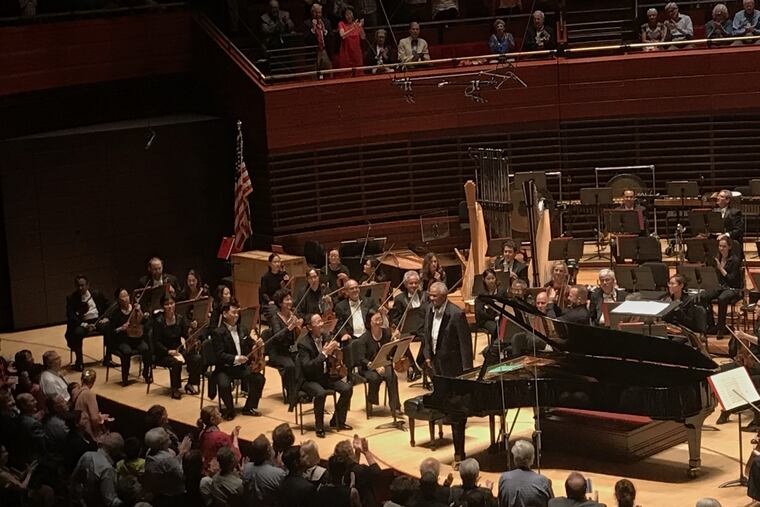Philadelphia Orchestra and Met Opera come together synergistically
Many bases were touched at the Philadelphia Orchestra's season opening weekend: New-ish music by Nico Muhly, the return of local favorite Andre Watts and the live recording of Rachmaninoff.

Yannick Nézet-Séguin's two starry jobs — at the Philadelphia Orchestra and the Metropolitan Opera — bore synergistic fruit at Friday's Verizon Hall concert: the premiere of Nico Muhly's Liar. The opening weekend of the Philadelphia Orchestra's season touched other bases as well, including the return of pianist André Watts, one of Philadelphia's favorite musical sons.
Commissioned by the orchestra, Liar is a suite of sorts based on Muhly's opera Marnie, premiered by the English National Opera last year and scheduled for its first U.S. hearing at the Met on Oct. 19. The debut on Friday of this orchestra-only encapsulation thus showed critical timing that would have been hard to achieve without Nézet-Séguin holding his dual posts. Most fortunately, the music is on solid artistic ground. Unlike Thomas Ades' Powder Her Face suite last season (best appreciated by those who'd rather not fully reenter that opera's cold, snarky world), Liar sits happily next to the original, raising interest in the opera version (which I've heard in a BBC recording) but a satisfying experience unto itself.
Based on the 1961 Winston Graham novel that was the source of Alfred Hitchcock's 1964 film, the opera's plot is best described as Catch Me If You Can meets The Three Faces of Eve. Marnie is a psychologically disturbed grifter who commits robbery at her every workplace, changes identities frequently, and marries one of her bosses to avoid jail. With the program notes enumerating what music comes from which plot point, you could expect the cut-and-paste job of various Der Rosenkavalier suites.
In fact, Liar has the overall arc of a good tone poem, starting with lush but metallic-edged sonorities, but later thinning out into a series of individual events – soulful wind solos, gathering storm clouds in lower instruments, and sustained notes in the string-writing conveying Marnie's unreachable core. A jagged, insistent trombone solo representing her husband sounded like coded messages being called out from afar. The opera's sexual politics are going to be questioned, but this suite will remind the world of the opera's considerable musical strengths – especially with high-caliber performances such as Friday's.
Now for Watts, who grew up here as a child wonder and is now 72, having weathered prostate cancer that prompted concert cancellations in 2016 and 2017. His mileage was apparent: Tempos for the Grieg Piano Concerto were exceptionally slow, making an already episodic concerto seem more so, though Watts often convinced you these were artistic choices, not technical necessities.
His aggressive, brassy tone quality of old was gone. In its place was some of the most lustrous playing I've ever heard from him. Any number of deeply poetic moments were seconded by Nézet-Séguin's sensitive, considered accompaniment. Heroism demanded by the music's imposing, nationalistic fervor was lacking. But in the first movement cadenza, the lion roared again, and with greater understanding of what the music means.
Finally, Rachmaninoff's Symphonic Dances – written for the Philadelphia Orchestra in 1940 – was recorded live for the Deutsche Grammophon label. Two out of three movements were stellar, the second with beautifully shaped melodies, the third with great dramatic momentum. The first movement, though, vacillated between under-energized rhythms and bombastic overstatement. It probably won't stay that way in future performances. Speaking of which: With the new bag-check policy, Kimmel Center patrons should leave extra time to get to their seats.
The program is repeated at 2 p.m. Sunday, Sept. 16, at the Kimmel Center. Tickets: $61-164. Information: 215-893-1999 or www.philorch.org.